Every act of creation, by its mere existence, denies the world of master and slave.
-Albert Camus, The Rebel
We often hear people claim to be slaves to their work, or the system of work, which implies a type of dehumanization. But there is another way to be diminished as a person in relationship to work; we could be prevented from working. For the Urbano Project, Constanza Aguirre, presents Wandering in the Land of Oblivion in which shadows of men and women perform different activities. Drawn on paper with ink, charcoal, pastel, and acrylic, people are shown fishing, hatmaking, farming, glassblowing, and doing other work. These people signify the masses that have been displaced by civil war in Aguirre’s home country of Colombia, finding it near impossible to maintain their work. Standing two meters by one meter each, these mostly dark figures are shadows without specific identities. Since part of what it means to be human is to have an identity through work, then, with a loss of work, they have lost some of their humanity.
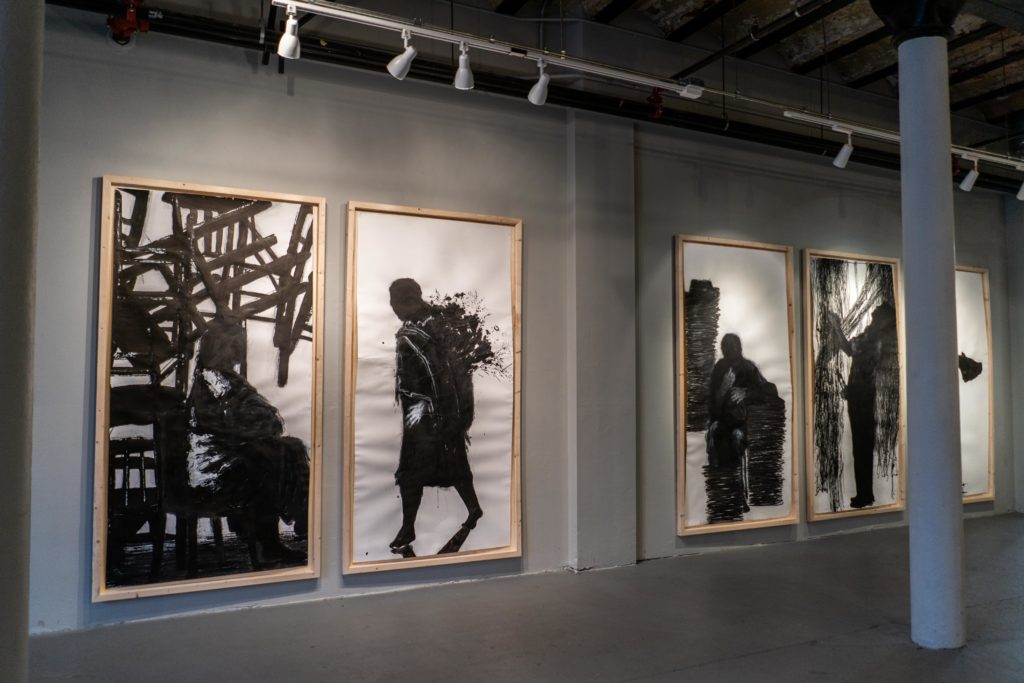
Installation of Wandering in the Land of Oblivion at the Urbano Project. Photo by Faizal Westcott courtesy of Urbano Project.
‘Having a job’ is not always the same as the kind of work I’m referring to here. For example, many people have jobs to pay their bills, but their real work is something beyond their day job. Either way, with the opportunity to work removed, our lives would be affected in two key ways: our identity and our leisure. I will explain these in turn.
In Plato’s famous cave analogy in the Republic, he asserts that what we experience is merely a shadow of ultimate reality. When interpreting this analogy, the focus is usually on a metaphysical theory about the nature of the world. But we can also apply it in more localized ways. Are we mere shadows of what we claim to be? Our individual identities are often not what they seem to us or especially to others, and we are represented in part by our work.
Our relationship with work is often confused. When asked who we are, we frequently claim to be what we do for work. There might be truth to that answer, especially when we feel it is more of a vocation. But when you don’t have a job or when it is taken away from you, what becomes of your identity? Our relationship to work is brought to a poignant realization in Wandering in the Land of Oblivion. Unidentified figures perform activities from textiles to fishing, and these shadowy actions illustrate the displacement that occurs when workers are prevented from working. Their identity becomes lost, in a real sense, when they cannot work.
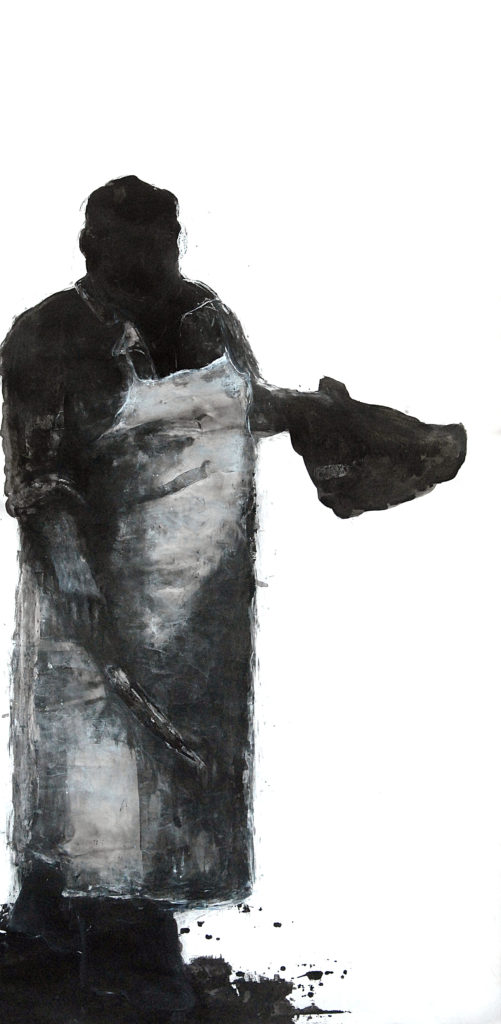
From Wandering in the Land of Oblivion. Courtesy of Constanza Aguirre.
Along with identity, our work also has a significant, but often overlooked, relationship with leisure. Aristotle writes, “Happiness seems to be found in leisure.” [1] In other words, we work in order to have leisure, which stands in contrast to idleness. “Leisure is a form of that stillness that is the necessary preparation for accepting reality.” [2] Leisure is the activity of contemplating the world in which we live, and we rest in its goodness and beauty. But when the difficulties of life arise, we find ourselves frequently distracted by things. The distractions only seem to amplify when we cannot work. The stress of not being able to work (or looking for a job) often leads to an inability to meaningfully be at leisure. According to Aristotle, this hinders our ability to be happy.
If work is required in order to have leisure, then the figures in Wandering in the Land of Oblivion are never able to truly rest from their work because they do not have the dignity of work. In other words, these figures, it seems to me, are doubly dehumanized. They do not have a proper or full identity as people, and they do not have the ability to enjoy leisure after their labor. And this is highlighted in Aguirre’s work. She presents the shadows of figures disconnected from their personal identities, forever toiling in her images. However, Aguirre’s images are actually hopeful as they represent the positive value of work for the individual and community. Our complicated relationship to work is further illustrated by her gestures on paper, which seem simple at a glance, but the layers are revealed as the viewer contemplates the lines and textures that form the images.
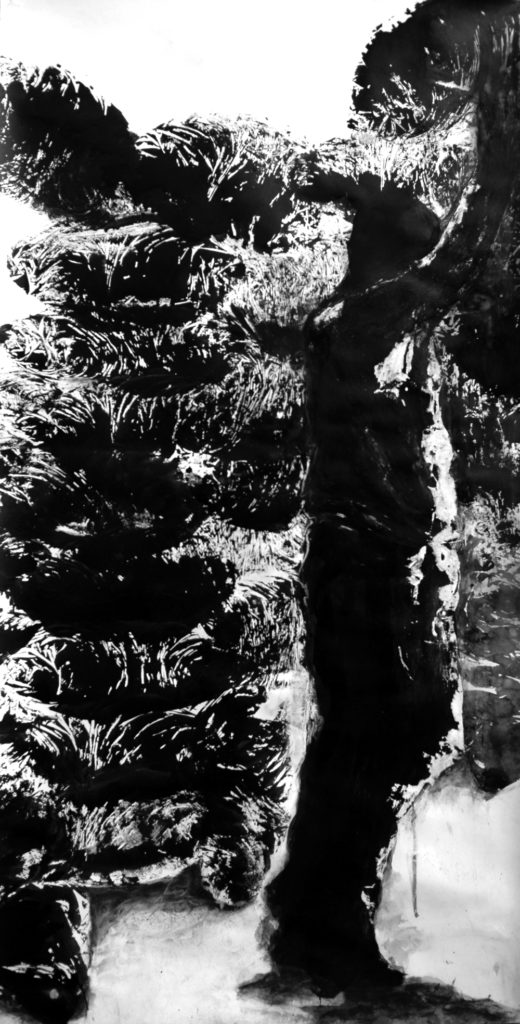
From Wandering in the Land of Oblivion. Courtesy of Constanza Aguirre.
While Wandering in the Land of Oblivion is on view, Aguirre will hold a one-month workshop with the students at Urbano. Through this workshop Aguirre and her students may explore their own identities associated with work, investigating how acts of creation can maintain their resilience and meaning in society. Specifically, art making can be a way to distinguish yourself as an individual and to remind yourself and others who you are and where you come from. In Colombia, the adverse conditions were very extreme, but milder adversity can also have a negative impact on our souls. In Boston, the constant struggle for families against being displaced by continuing rent increases and gentrification can be similarly harrowing. Aguirre’s work testifies to the defiant creations that declare our personhood to a world that continually tries to diminish it.
Wandering in the Land of Oblivion is on view through January 11, 2019.
[1] Aristotle, Nicomachean Ethics, 2nd edition, translated by Terence Irwin (Indianapolis: Hackett Publishing Company, Inc., 1999), 164 (1177b.5).
[2] Josef Pieper, Leisure: the Basis of Culture, translated by Gerald Malsbarry (South Bend, IN: St. Augustine’s Press, 1998), 31.

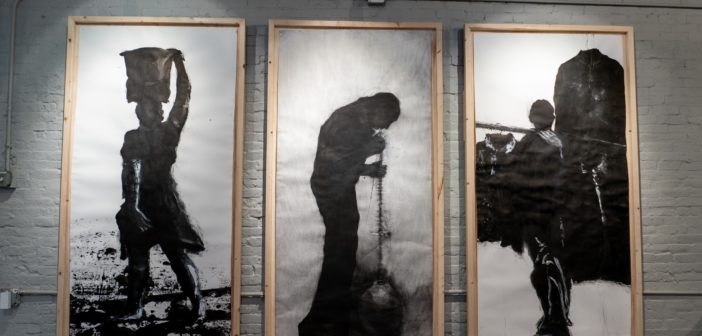
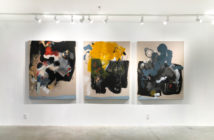
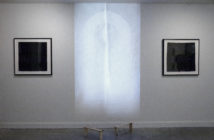
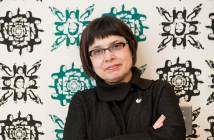
1 Comment
Fascinating relationship between work and leisure. Michael, you certainly explained this art exhibit well and it lends itself to provoke others to look at art more deeply.